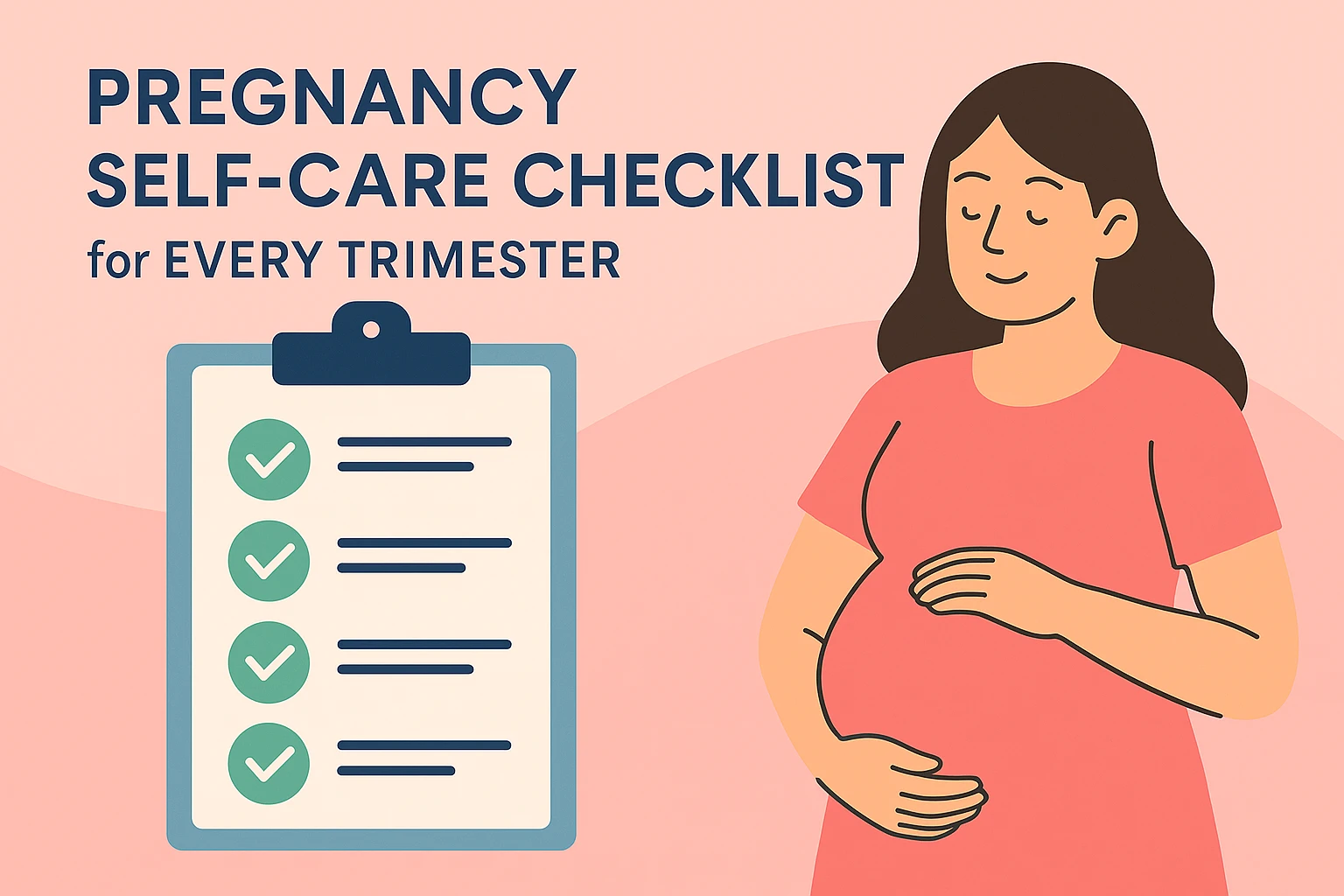The Ultimate Pregnancy Self-Care Checklist for Every Trimester
Self-care is non-negotiable. Use this trimester-by-trimester printable checklist to prioritize mental health, manage common symptoms, and nurture your changing body from week 1 to birth.

Try Related Tools
Use our medically reviewed calculators to get accurate insights.
Pregnancy is often presented as a time to focus intensely on everyone and everything except yourself. You’re scheduling doctor appointments, organizing a nursery, and reading endless books—all focused on the baby.
But here is the foundational truth: Self-care is not selfish; it is prenatal care.
Prioritizing your own physical comfort, mental health, and rest directly creates the healthiest environment for your developing baby. As your body changes drastically throughout the three trimesters, your self-care needs must adapt with it. What helps in Week 8 (managing nausea) is different from what helps in Week 38 (managing pelvic pressure).
This comprehensive guide offers a self-care checklist broken down by trimester. Use it to stay organized, mindful, and physically strong throughout your entire journey.
Table of Contents
- The Golden Rule: Listen to Your Body
- Printable Pregnancy Self-Care Checklist: Trimester by Trimester
- The Mental Health Component (YMYL Standard)
The Golden Rule: Listen to Your Body
Always remember that energy levels and needs fluctuate daily during pregnancy. On days when exhaustion hits, the best form of self-care might be canceling all plans and taking a nap. On days when you feel great, channel that energy into prepping for the future.
If any of these actions cause pain, discomfort, or dizziness, stop immediately and consult your healthcare provider.
Printable Pregnancy Self-Care Checklist: Trimester by Trimester
First Trimester Checklist (Weeks 1-13)
The focus is survival: managing fatigue, nausea, and early hormonal swings.
| Category | Task | Status (☐) |
|---|---|---|
| Physical & Diet | Schedule first prenatal visit (Dating Scan) | ☐ |
| Physical & Diet | Start taking a Prenatal Vitamin daily | ☐ |
| Physical & Diet | Start carrying simple snacks (crackers, almonds) to manage nausea | ☐ |
| Physical & Diet | Increase water intake to combat fatigue and constipation | ☐ |
| Emotional & Rest | Prioritize going to bed 1 hour earlier than usual | ☐ |
| Emotional & Rest | Give yourself permission to say "No" to extra commitments | ☐ |
| Emotional & Rest | Find one trusted person (partner/friend) to confide in | ☐ |
| Wellness | Determine your caffeine limit (below 200mg/day) | ☐ |
Second Trimester Checklist (Weeks 14-27)
The focus is stability: managing physical growth, building strength, and planning ahead.
| Category | Task | Status (☐) |
|---|---|---|
| Physical & Comfort | Start training yourself to sleep on your side (SOS) | ☐ |
| Physical & Comfort | Buy a full-body Pregnancy Pillow for support | ☐ |
| Physical & Comfort | Start a gentle Prenatal Yoga or Swimming routine | ☐ |
| Physical & Comfort | Begin gentle Pelvic Floor exercises (Kegels) | ☐ |
| Physical & Comfort | Buy supportive bra/shoes to accommodate growth | ☐ |
| Emotional & Mental | Start a short daily gratitude or mindfulness journal | ☐ |
| Emotional & Mental | Dedicate 15 minutes a day to a non-pregnancy hobby | ☐ |
| Planning | Discuss the second trimester anatomy scan options with your partner | ☐ |
Third Trimester Checklist (Weeks 28-40)
The focus is preparation: managing weight, maximizing rest, and getting ready for labor.
| Category | Task | Status (☐) |
|---|---|---|
| Physical & Comfort | Use pillows/wedge to prop up feet to reduce swelling | ☐ |
| Physical & Comfort | Practice the "Elevator" technique for Pelvic Floor relaxation | ☐ |
| Physical & Comfort | Walk daily to promote good baby positioning and manage pain | ☐ |
| Physical & Comfort | Identify the symptoms of Preeclampsia (e.g., persistent headache, vision changes) | ☐ |
| Emotional & Mental | Finalize the birth plan and talk through fears with your partner | ☐ |
| Emotional & Mental | Schedule a non-pregnancy-related date night or massage | ☐ |
| Preparation | Set up "feeding/changing stations" in your home (Nesting) | ☐ |
| Preparation | Pack your hospital bag (include snacks for you) | ☐ |
The Mental Health Component (YMYL Standard)
Self-care must always include vigilance for your mental health. The emotional landscape of pregnancy is unstable, particularly due to hormonal shifts and the anxiety of the unknown.
- Acknowledge Anxiety: It is normal to worry about the baby's health, labor pain, and the transition to parenthood. Verbalizing these fears to your support system is a form of self-care.
- Seek Professional Support: If anxiety or depression becomes persistent, severe, or interferes with your daily functioning, it is a medical issue that needs professional help. Never assume you can "think your way out of" chronic mental health issues. Consult your doctor or midwife for screening and referrals to a prenatal therapist.
By being proactive, kind, and organized, you ensure that you are ready for the emotional and physical demands of childbirth and the Fourth Trimester.
Medical Disclaimer
This article is a guide intended for self-care, informational, and lifestyle purposes only. It does not replace professional medical diagnosis or treatment. All supplements, exercises, and physical routines should be reviewed and approved by your obstetrician or qualified healthcare provider.
About the Author
Abhilasha Mishra is a health and wellness writer specializing in women's health, fertility, and pregnancy. With a passion for empowering individuals through evidence-based information, she writes to make complex health topics accessible and actionable.